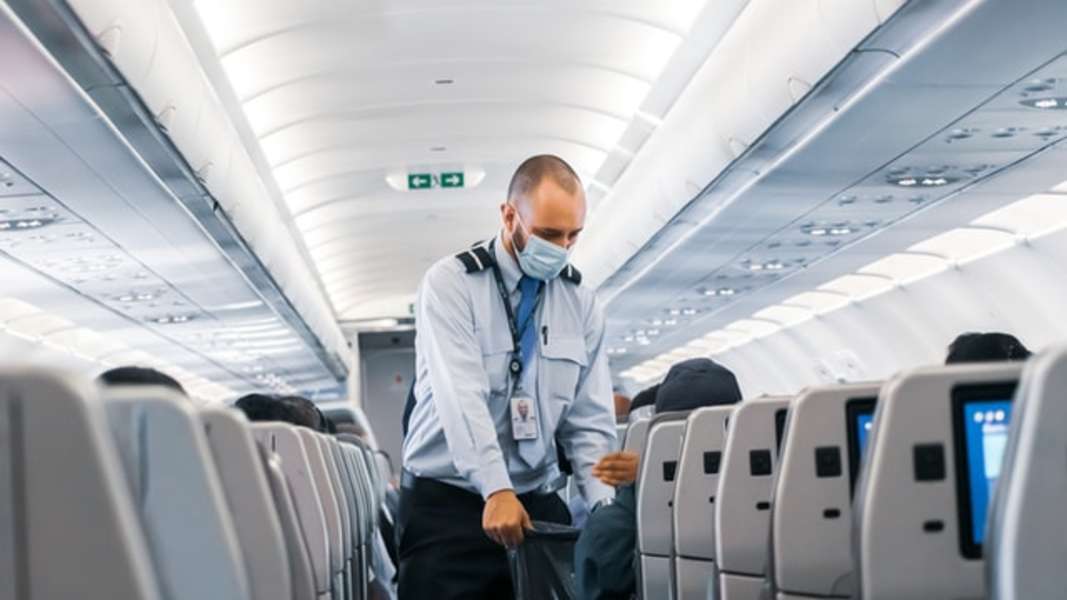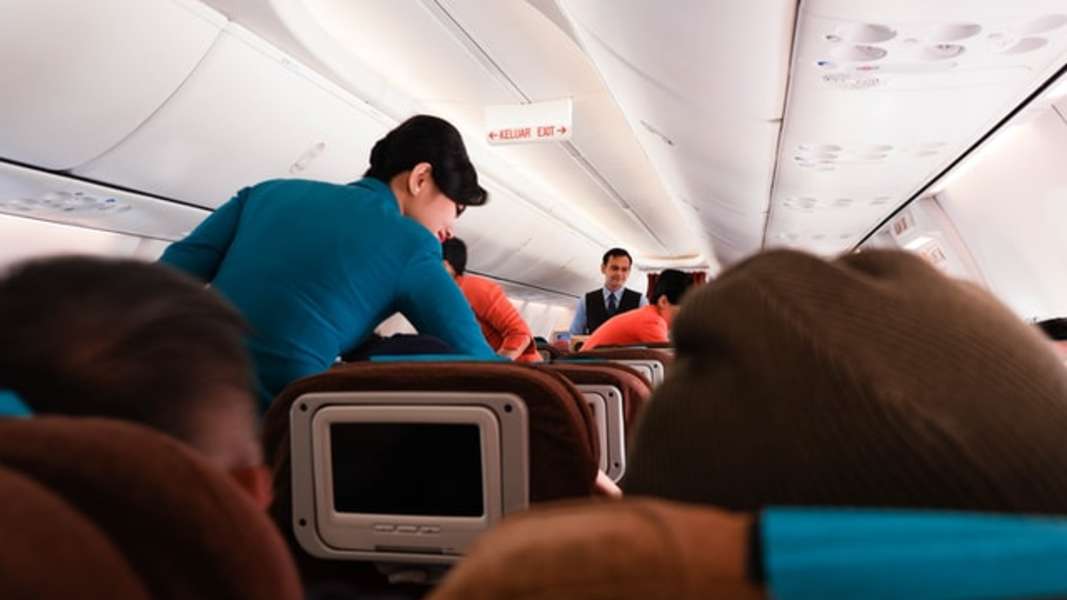
How To Hire A Flight Attendant
June 08, 2022

A great flight attendant is an ambassador for the company, and is often the first and last employee that a passenger will have contact with when flying.
A flight attendant will greet a passenger as they enter the plane, show the passenger to their seat, and ensure that any carry-on luggage is stowed appropriately.
The flight attendant will demonstrate the safety protocols for the passengers and ensure that everyone is ready for takeoff. Once in the air, the flight attendant will need to be able to offer excellent customer service throughout the flight, answering questions, providing meals and beverages, and ensuring comfort and safety.
As the end of the flight nears, the flight attendant will ensure that all passengers have returned to their seats ready for landing, following protocols for safety. Once the plane has landed, they will help passengers disembark.
Flight attendants are responsible for the safety, security and comfort of passengers while they fly, and they need to have different skills and abilities to be successful.
In this article, we will discuss the daily tasks of a flight attendant, look at the skills, abilities and aptitudes that a successful flight attendant needs to have, and the tests that could be used to assess potential flight attendants to be sure they have the required level of competency.
What should a flight attendant be able to do?
The daily tasks of a flight attendant revolve around ensuring the comfort and happiness of customers and passengers.
Before the flight is scheduled to leave, flight attendants will need to attend briefings to understand what to expect from the flight, including things like weather conditions, the number of passengers, how long the flight will be, and how the flight will be staffed. They will also need to inspect and clean the cabin, check emergency equipment and first aid provisions, as well as ensuring there is a plentiful supply of food, beverages, and additional equipment like headphones and blankets when necessary.
As passengers begin to arrive, the flight attendants will welcome passengers on board, check tickets, and direct them to their seats. The flight attendant will need to be aware of any passengers that might need additional support, such as young children, disabled people, or the elderly. Once all the passengers are seated, the flight attendants will go through the safety briefing and get the plane ready for takeoff.
While in the air, flight attendants need to monitor the passengers to ensure safety and security, and provide assistance when required. This includes selling beverages, providing hot or cold meals, and helping passengers with audio and video systems.
As the flight comes to an end, the flight attendants are responsible for making sure that passengers return to their seats and follow procedures ready for landing, and then help passengers to collect their carry-on luggage from the overhead lockers or under the seats before they disembark.
At any point throughout the flight, a flight attendant may be required to deal with an emergency, including offering first aid when necessary.
Skills to look for in a flight attendant
There are a few skills that are important to look for in a potential flight attendant, although not many are technology-based - the role of a flight attendant is predominately about providing amazing customer service and representing the airline in the best way.
Some of the skills that you should look for when hiring a flight attendant include:
- Active Listening: flight attendants will have to be able to deal with passengers throughout the flight, which might mean listening to complaints or problems so they can be dealt with. A flight attendant needs to be able to pay attention to non-verbal cues and really understand what a passenger is saying.
- Service Orientation: as the face of the airline, a flight attendant must look after passengers with real consideration to providing outstanding service.
- Critical Thinking: flight attendants will have to make quick, well-considered decisions on a flight to ensure the comfort, safety, and security of all passengers, which means they need to be able to think clearly and critically about situations.
- Time Management: even on longer flights, there is a finite amount of time available for flight attendants to be able to perform all their duties, so good time management skills will ensure that a candidate can use their time wisely by planning and preparing to meet targets and deadlines.
- Speaking: flight attendants must be able to speak clearly and be understood, especially when they are imparting important information like the safety briefing. They also need to be able to speak to passengers during the flight to be able to answer questions and provide instructions.
Useful abilities for a flight attendant
The inherent abilities and aptitudes of a flight attendant should all be geared towards providing good service for passengers, which means there are certain abilities that the recruitment team should look for when considering potential employees.
These include:
- Oral Expression and Comprehension: for a flight attendant, speaking to be understood and listening to understand are central to providing excellent customer service, so the ability to comprehend language and express themselves orally is a necessary ability.
- Deductive and Inductive Reasoning: making good decisions is not just about thinking critically, it is also about being able to make logical deductions based on specific knowledge or spotting patterns and trends. Logical reasoning, both deductive and inductive, will lead to better judgement and decision making.
- Information Ordering: there is a lot to think about for a flight attendant, and being able to order information in such a way that it is logical and easy to understand will help when completing inventories, gathering data from briefings and speaking directly to customers.
- Perceptual Speed: the ability to perceive and react to new information is important in flight, but also on the ground too. Flight attendants need to be responsive to changing priorities and able to adapt to new situations seamlessly.
- Speech Clarity and Comprehension: providing instructions, demonstrating safety procedures, and being able to assist passengers when needed demands the ability to speak clearly. Flight attendants must also be able to understand the speech of others, especially in noisy and chaotic situations so that they can help in an emergency.
Which soft skills tests could I use to hire a flight attendant?
Soft skills are often the hardest skills to assess without using some form of testing when you are recruiting for a flight attendant. It can be difficult to judge how adept a candidate is at dealing with problems, communicating or working as part of a team from the information provided in a resume or application form, and even in an interview.
Soft skills testing gives recruiters the quantifiable data they need to choose the applicants who have the required level of soft skills to be successful in the future.
For the flight attendant role, the following soft skill tests would be useful:
- Communication: dealing with passengers and fellow crew members effectively need excellent communication skills, which include active listening, understanding non-verbal cues, and effective negotiation. The communication soft skills test will demonstrate a candidate's ability to communicate effectively in a workplace situation.
- Decision Making: when problems arise in midair, quick decisions need to be made using all the available information for passenger comfort and safety - so using a decision making soft skill test will show which applicants are able to think critically and make logical decisions.
- Interpersonal Skills: more than just communication, interpersonal skills describe the way a candidate reacts to different people, how they present themselves, and how they work in a team. The interpersonal skills soft test puts candidates into work-related scenarios to see how they build and use relationships to find an effective outcome to problematic situations.
- Time Management: with so many duties to take care of in-flight and on the ground, a flight attendant needs to be able to multitask effectively and get things done to deadlines, from serving food to ensuring passengers are in their seats ready for the landing procedures. The time management test assesses whether the candidate can balance multiple tasks and complete work to a deadline.
- Teamwork: there are multiple cabin crew members on every flight, and flight attendants must be happy to work effectively as part of a team, following instructions and leading others when necessary. The teamwork soft skill test is an assessment of the candidate's ability to use effective teamwork to solve issues and ensure good customer service.
Which technical or aptitude tests could I use to hire a flight attendant?
Flight attendants do not necessarily need to have technical skills as the role is mostly customer-facing, but there are several aptitudes that a person needs to have in order to be successful as a flight attendant.
These are not easy to quantify through an interview or through reading a resume or application form, but the following tests will demonstrate whether their level of competency matches the requirements of the role:
- Logical Reasoning: making logical decisions based on both general knowledge and unfamiliar information needs reasoned thinking, and the logical reasoning assessment allows candidates to demonstrate that they can think critically about presented information before making a deduction.
- Error Checking: small details can make the difference between a successful, comfortable and safe flight and something that might be dangerous to passengers and other cabin crew, so the error checking assessment will demonstrate which candidates are able to highlight inconsistencies and notice small problems before they become big problems.
- Numerical Reasoning: flight attendants will need to have some numerical ability to be able to keep an eye on stock levels and take payments for food and beverages bought by passengers on the flight, and the numerical reasoning test demonstrates whether a candidate is able to work comfortably with numbers and apply basic operations.
- Verbal Reasoning: the verbal reasoning assessment is used to evaluate whether a candidate has the ability to read, understand and analyse written information, using it to make a reasoned decision. This demonstrates an aptitude for understanding language.
Our recommended test battery for a flight attendant
The above tests will give a thorough picture of the soft skills and aptitudes of a candidate for a flight attendant role, but using all of them might be unwieldy and difficult, making the applicants feel like they are jumping through hoops.
Below is our recommended test battery for a flight attendant role:
- Verbal Reasoning: in this assessment, candidates are presented with a passage of text, usually written in business language, which they need to read, understand and analyse to be able to answer the multiple-choice question that follows.
- Logical Reasoning: in this assessment, the candidate is presented with a series of shapes or images, with one missing. They will need to find the pattern that governs this sequence and apply it to choose the right item from the multiple-choice options given.
- Communication: the communication assessment has a similar format to the situational judgement assessment, where the candidate is presented with a work-related scenario. They need to choose the course of action that is most like what they would do in that situation, highlighting their communication and interpersonal skills.
- Teamwork: flight attendants work in small teams within confined spaces for long periods of time. This means that excellent teamwork is required to make for a pleasant work environment.
- Interpersonal Skills: interpersonal skills are critical for airlines to look for when hiring cabin crew - they are the face of company and will represent the airline before, during and after the flight.
For more information on hiring a flight attendant, check out Neuroworx's page on flight attendant tests.
Boost your hiring power.
Start using Neuroworx today.
Talk is cheap. We offer a 14-day free trial so you can see our platform for yourselves.
Try for free




